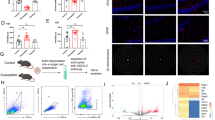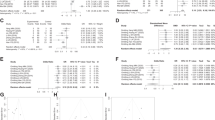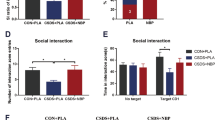Abstract
Presently, the regulatory mechanism underlying depression is indistinct, and almost 50% of depression sufferers undergo no apparent effects during treatment. This study explored the effects of medicarpin on depressive-like behaviors in a chronic unpredictable mild stress (CUMS)-induced mouse model of depression. The results of network pharmacological analysis revealed that liver X receptor β (LXRβ) might be a potential target of medicarpin and depression. The LXRβ level was reduced in the amygdala of mice induced by CUMS; however, this effect was suppressed by co-treatment with medicarpin. Medicarpin treatment ameliorated depressive-like behaviors in CUMS-induced mice by modulating LXRβ level. Moreover, medicarpin treatment reduced M1 polarization and enhanced M2 polarization of amygdala microglia in CUMS-induced mice, as well as increased GFAP level in the amygdala. Medicarpin treatment also suppressed CUMS-induced inflammation and hindered nuclear factor-κ B (NF-κB) signaling activation. These data indicate that medicarpin activated astrocytes and inhibited microglia M1 polarization while promoted M2 polarization by enhancing the expression of LXRβ. Hence, our results suggest that medicarpin could have a positive effect on the treatment of depression, and LXRβ could serve as a novel therapeutic target.







Similar content being viewed by others
Availability of Data and Materials
All data generated or analyzed during this study are included in this published article and its additional files.
References
Chen QJ, Shi Y, Shi JF, Yuan ZH, Ma JY, Fang SR, Gu W (2017) Liver X receptors agonist T0901317 downregulates matrix metalloproteinase-9 expression in non-small-cell lung cancer by repressing nuclear factor-κ B. Anticancer Drugs 28:952–958
Chern CM, Lu CK, Liou KT, Wang YH, Tsai KC, Chang CL, Chang CC, Shen YC (2021) Medicarpin isolated from Radix Hedysari ameliorates brain injury in a murine model of cerebral ischemia. J Food Drug Anal 29:581–605
Cuijpers P, Quero S, Dowrick C, Arroll B (2019) Psychological treatment of depression in primary care: recent developments. Curr Psychiatry Rep 21:129
Ding H, Li Y, Feng Y, Chen J, Zhong X, Wang N, Wang W, Zhang P, Wang L (2016) LXR agonist T0901317 upregulates thrombomodulin expression in glomerular endothelial cells by inhibition of nuclear factor-κ B. Mol Med Rep 13:4888–4896
Disease GBD, Injury I, Prevalence C (2016) Global, regional, and national incidence, prevalence, and years lived with disability for 310 diseases and injuries, 1990–2015: a systematic analysis for the Global Burden of Disease Study 2015. Lancet 388:1545–1602
Galecki P, Talarowska M (2018) Inflammatory theory of depression. Psychiatr Pol 52:437–447
Imran KM, Yoon D, Lee TJ, Kim YS (2018) Medicarpin induces lipolysis via activation of Protein Kinase A in brown adipocytes. BMB Rep 51:249–254
Joormann J, Stanton CH (2016) Examining emotion regulation in depression: a review and future directions. Behav Res Ther 86:35–49
Kim JH, Kang DM, Cho YJ, Hyun JW, Ahn MJ (2022) Medicarpin increases antioxidant genes by inducing NRF2 transcriptional level in HeLa cells. Antioxidants (Basel) 11
Li LF, Yang J, Ma SP, Qu R (2013) Magnolol treatment reversed the glial pathology in an unpredictable chronic mild stress-induced rat model of depression. Eur J Pharmacol 711:42–49
Li X, Zhong H, Wang Z, Xiao R, Antonson P, Liu T, Wu C, Zou J, Wang L, Nalvarte I, Xu H, Warner M, Gustafsson JA, Fan X (2021) Loss of liver X receptor beta in astrocytes leads to anxiety-like behaviors via regulating synaptic transmission in the medial prefrontal cortex in mice. Mol Psychiatry 26:6380–6393
Malhi GS, Mann JJ (2018) Depression. Lancet 392:2299–2312
McCarron RM, Shapiro B, Rawles J, Luo J (2021) Depression. Ann Intern Med 174:ITC65-ITC80
Michel M, Fiebich BL, Kuzior H, Meixensberger S, Berger B, Maier S, Nickel K, Runge K, Denzel D, Pankratz B, Schiele MA, Domschke K, van Elst LT, Endres D (2021) Increased GFAP concentrations in the cerebrospinal fluid of patients with unipolar depression. Transl Psychiatry 11:308
Tottenham N, Weissman MM, Wang Z, Warner V, Gameroff MJ, Semanek DP, Hao X, Gingrich JA, Peterson BS, Posner J, Talati A (2021) Depression risk is associated with weakened synchrony between the amygdala and experienced emotion. Biol Psychiatry Cogn Neurosci Neuroimaging 6:343–351
Wang YL, Han QQ, Gong WQ, Pan DH, Wang LZ, Hu W, Yang M, Li B, Yu J, Liu Q (2018) Microglial activation mediates chronic mild stress-induced depressive- and anxiety-like behavior in adult rats. J Neuroinflammation 15:21
Wang YL, Wu HR, Zhang SS, Xiao HL, Yu J, Ma YY, Zhang YD, Liu Q (2021) Catalpol ameliorates depressive-like behaviors in CUMS mice via oxidative stress-mediated NLRP3 inflammasome and neuroinflammation. Transl Psychiatry 11:353
White SW, Simmons GL, Gotham KO, Conner CM, Smith IC, Beck KB, Mazefsky CA (2018) Psychosocial treatments targeting anxiety and depression in adolescents and adults on the autism spectrum: review of the latest research and recommended future directions. Curr Psychiatry Rep 20:82
Wyska E (2019) Pharmacokinetic considerations for current state-of-the-art antidepressants. Expert Opin Drug Metab Toxicol 15:831–847
Xu X, Xiao X, Yan Y, Zhang T (2021) Activation of liver X receptors prevents emotional and cognitive dysfunction by suppressing microglial M1-polarization and restoring synaptic plasticity in the hippocampus of mice. Brain Behav Immun 94:111–124
Ye Y, Wang G, Wang H, Wang X (2011) Brain-derived neurotrophic factor (BDNF) infusion restored astrocytic plasticity in the hippocampus of a rat model of depression. Neurosci Lett 503:15–19
Zhang B, Wei YZ, Wang GQ, Li DD, Shi JS, Zhang F (2018) Targeting MAPK pathways by naringenin modulates microglia M1/M2 polarization in lipopolysaccharide-stimulated cultures. Front Cell Neurosci 12:531
Funding
This study was funded by National Natural Science Foundation of China (No. 82001422 for Dr. Li) and the Natural Science Foundation of Jiangsu Province for Dr. Li (Grants No BK 20200274).
Author information
Authors and Affiliations
Contributions
We declare that this work was done by the author(s) named in this article and all liabilities pertaining to claims relating to the content of this article will be borne by the authors. YL conceived and designed the study. XH, JZ, and QZ collected the data. XL and GZ analyzed the data. YL wrote the manuscript. All authors read and approved the manuscript for publication.
Corresponding author
Ethics declarations
Ethics Approval
This study was approved by an institutional review board of Jinling Hospital, Medical School of Nanjing University.
Conflict of Interest
The authors declare no competing interests.
Additional information
Publisher's Note
Springer Nature remains neutral with regard to jurisdictional claims in published maps and institutional affiliations.
Rights and permissions
Springer Nature or its licensor (e.g. a society or other partner) holds exclusive rights to this article under a publishing agreement with the author(s) or other rightsholder(s); author self-archiving of the accepted manuscript version of this article is solely governed by the terms of such publishing agreement and applicable law.
About this article
Cite this article
Li, Y., He, X., Zhang, J. et al. Medicarpin Improves Depressive-Like Behaviors in a Chronic Unpredictable Mild Stress-Induced Mouse Model of Depression by Upregulating Liver X Receptor β Expression in the Amygdala. Neurotox Res 40, 1937–1947 (2022). https://doi.org/10.1007/s12640-022-00610-7
Received:
Revised:
Accepted:
Published:
Issue Date:
DOI: https://doi.org/10.1007/s12640-022-00610-7




